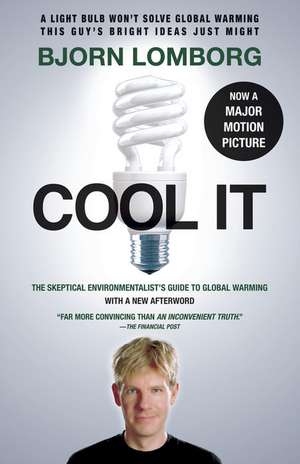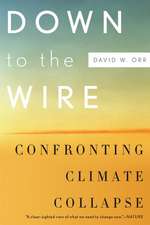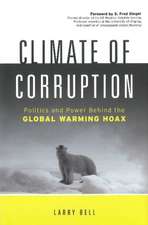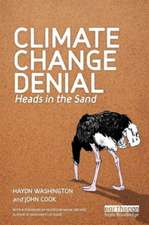Cool It: The Skeptical Environmentalist's Guide to Global Warming: Random House Movie Tie-In Books
Autor Bjorn Lomborgen Limba Engleză Paperback – 30 sep 2010
Preț: 90.11 lei
Nou
Puncte Express: 135
Preț estimativ în valută:
17.24€ • 18.05$ • 14.27£
17.24€ • 18.05$ • 14.27£
Carte disponibilă
Livrare economică 15-29 martie
Preluare comenzi: 021 569.72.76
Specificații
ISBN-13: 9780307741103
ISBN-10: 0307741109
Pagini: 277
Dimensiuni: 134 x 203 x 17 mm
Greutate: 0.32 kg
Editura: Vintage Books USA
Seria Random House Movie Tie-In Books
ISBN-10: 0307741109
Pagini: 277
Dimensiuni: 134 x 203 x 17 mm
Greutate: 0.32 kg
Editura: Vintage Books USA
Seria Random House Movie Tie-In Books
Notă biografică
Bjorn Lomborg is the author of The Skeptical Environmentalist and has written for numerous publications, including The New York Times, The Wall Street Journal, The Economist, and USA Today. He was named one of the 100 most influential people in the world by Time magazine in 2004. In 2008 he was named “one of the 50 people who could save the planet” by The Guardian; one of the top 100 public intellectuals by Foreign Policy and Prospect magazine; and one of the world’s 75 most influential people of the 21st century by Esquire. He is presently an adjunct professor at the Copenhagen Business School, and in 2004 he started the Copenhagen Consensus, a conference of top economists who come together to prioritize the best solutions for the world’s greatest challenges.
Visit the author's website at www.lomborg.com.
Visit the author's website at www.lomborg.com.
Extras
Preface
Global warming has been portrayed recently as the greatest crisis in the history of civilization. As of this writing, stories on it occupy the front pages of Time and Newsweek and are featured prominently in countless media around the world. In the face of this level of unmitigated despair, it is perhaps surprisingߝand will by many be seen as inappropriateߝto write a book that is basically optimistic about humanity’s prospects.
That humanity has caused a substantial rise in atmospheric carbon-dioxide levels over the past centuries, thereby contributing to global warming, is beyond debate. What is debatable, however, is whether hysteria and headlong spending on extravagant CO2-cutting programs at an unprecedented price is the only possible response. Such a course is especially debatable in a world where billions of people live in poverty, where millions die of curable diseases, and where these lives could be saved, societies strengthened, and environments improved at a fraction of the cost.
Global warming is a complex subject. No oneߝnot Al Gore, not the world’s leading scientists, and most of all not myselfߝclaims to have all the knowledge and all the solutions. But we have to act on the best available data from both the natural and the social sciences. The title of this book has two meanings: the first and obvious one is that we have to set our minds and resources toward the most effective way to tackle long-term global warming. But the second refers to the current nature of the debate. At present, anyone who does not support the most radical solutions to global warming is deemed an outcast and is called irresponsible and is seen as possibly an evil puppet of the oil lobby. It is my contention that this is not the best way to frame a debate on so crucial an issue. I believe most participants in the debate have good and honorable intentionsߝwe all want to work toward a better world. But to do so, we need to cool the rhetoric, allowing us to have a measured discussion about the best ways forward. Being smart about our future is the reason we have done so well in the past. We should not abandon our smarts now.
If we manage to stay cool, we will likely leave the twenty-first century with societies much stronger, without rampant death, suffering, and loss, and with nations much richer, with unimaginable opportunity in a cleaner, healthy environment.
From the Hardcover edition.
Global warming has been portrayed recently as the greatest crisis in the history of civilization. As of this writing, stories on it occupy the front pages of Time and Newsweek and are featured prominently in countless media around the world. In the face of this level of unmitigated despair, it is perhaps surprisingߝand will by many be seen as inappropriateߝto write a book that is basically optimistic about humanity’s prospects.
That humanity has caused a substantial rise in atmospheric carbon-dioxide levels over the past centuries, thereby contributing to global warming, is beyond debate. What is debatable, however, is whether hysteria and headlong spending on extravagant CO2-cutting programs at an unprecedented price is the only possible response. Such a course is especially debatable in a world where billions of people live in poverty, where millions die of curable diseases, and where these lives could be saved, societies strengthened, and environments improved at a fraction of the cost.
Global warming is a complex subject. No oneߝnot Al Gore, not the world’s leading scientists, and most of all not myselfߝclaims to have all the knowledge and all the solutions. But we have to act on the best available data from both the natural and the social sciences. The title of this book has two meanings: the first and obvious one is that we have to set our minds and resources toward the most effective way to tackle long-term global warming. But the second refers to the current nature of the debate. At present, anyone who does not support the most radical solutions to global warming is deemed an outcast and is called irresponsible and is seen as possibly an evil puppet of the oil lobby. It is my contention that this is not the best way to frame a debate on so crucial an issue. I believe most participants in the debate have good and honorable intentionsߝwe all want to work toward a better world. But to do so, we need to cool the rhetoric, allowing us to have a measured discussion about the best ways forward. Being smart about our future is the reason we have done so well in the past. We should not abandon our smarts now.
If we manage to stay cool, we will likely leave the twenty-first century with societies much stronger, without rampant death, suffering, and loss, and with nations much richer, with unimaginable opportunity in a cleaner, healthy environment.
From the Hardcover edition.
Recenzii
“Far more convincing than An Inconvenient Truth.”
—The Financial Post
“Brimming with useful facts and common sense. . . . [Lomborg's] analysis is smart and refreshing, and it may bridge at least one divide in our too divided culture.”
—The Wall Street Journal
“Enlightening, eye-opening, brain-nourishing stuff!”
—Los Angeles Times
“A reasoned addition to the debate about what to do about climate change. . . . Sure to provoke much controversy.”
—Esquire
“Bjorn Lomborg is the best-informed and most humane advocate for environmental change in the world today. . . . [He] and Cool It are our best guides to our shared environmental future.”
—Michael Crichton
“[A] calm, civil, even-handed analysis. [Cool It] is suffused with concern for socially beneficial priorities and for practical steps to do good. . . . It provides some badly needed balance.”
—Financial Times
—The Financial Post
“Brimming with useful facts and common sense. . . . [Lomborg's] analysis is smart and refreshing, and it may bridge at least one divide in our too divided culture.”
—The Wall Street Journal
“Enlightening, eye-opening, brain-nourishing stuff!”
—Los Angeles Times
“A reasoned addition to the debate about what to do about climate change. . . . Sure to provoke much controversy.”
—Esquire
“Bjorn Lomborg is the best-informed and most humane advocate for environmental change in the world today. . . . [He] and Cool It are our best guides to our shared environmental future.”
—Michael Crichton
“[A] calm, civil, even-handed analysis. [Cool It] is suffused with concern for socially beneficial priorities and for practical steps to do good. . . . It provides some badly needed balance.”
—Financial Times













